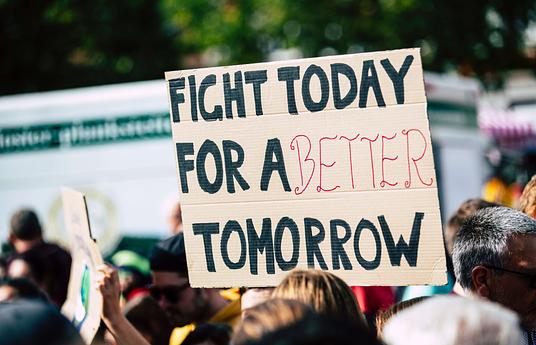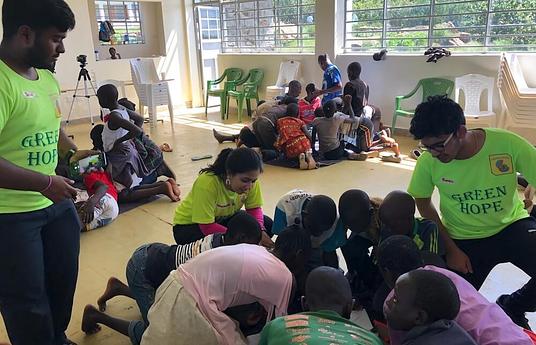The UN Climate Change Conference in Glasgow (COP26) brought together 120 world leaders and over 40,000 registered participants, including 22,274 party delegates, 14.124 observers and 3.886 media representatives. For two weeks in the fall of 2021, the world was fixated on all facets of climate change — the science, the solutions, the political will to act, and clear indications of action. There was much anticipation around this event, specifically on the actionable outcomes of the Conference, people from around the world flocked to be part of the conversation and bring a variety of perspectives, experiences and concerns. At HundrED, we were particularly interested in the conversations surrounding climate education.
Here are some of our key takeaways as well as a curated selection of education innovations making climate education a priority.
1. Education must play a more active role in mitigating the risks of the climate crisis
Opinions are mixed on the outcome of COP26, but what we know for sure is that education must play a more active role in mitigating the risks of the current climate crisis.
Young people are calling for drastic and actionable steps from world leaders and a call to work together to save our planet. At HundrED, our response is to acknowledge the challenge and highlight innovative solutions in education that are working towards this goal.
Only 53% of the world’s national education curricula make any reference to climate change and when the subject is mentioned, it is almost always given very low priority.
A new report from UNESCO compiled data from 100 countries and shows that only 53% of the world’s national education curricula make any reference to climate change and when the subject is mentioned, it is almost always given very low priority.
In response, for the first time ever, Ministers of Education and Environment came together at COP26 to pledge to integrate climate change and sustainable development into learning in an event co-organized by the UK Presidency, Government of Italy, UNESCO and youth partners MockCOP and Youth4Climate.
2. Girls Education is one of the most powerful tools we have to fight climate change
Additionally, there was conversation around the negative impacts of the climate crisis especially affecting young girls. As Malawi’s Minister of Education, Agnes Nyalonje, arrived in Scotland to attend the conference, a storm came through damaging many schools in rural villages in her country. Schools they could not afford to lose in response Nyalonje said, “When the schools got destroyed, I’m sitting there thinking ‘now I’m going to this climate change conference, I am going to talk about how to protect girls, climate change events such as this storm that hit Malawi on Monday sets me back every time it happens.”
"We cannot hope to build resilience for the decades ahead unless we educate all children. This especially is true for girls. Education prepares women to develop climate solutions, secure green jobs and address issues at the heart of this crisis.”
At the same panel, Nobel Peace Prize laureate and education activist Malala Yousafzai said via video "We cannot hope to build resilience for the decades ahead unless we educate all children. This especially is true for girls. Education prepares women to develop climate solutions, secure green jobs and address issues at the heart of this crisis.”
Girls Education & Climate Education were two central themes during the HundrED 2021 Innovation Summit and will continue to be areas of focus in the upcoming year.
3. There are inspiring environmental education innovations impacting young people right now - here’s a list of some of our favourites
Explore the 8 innovations having a positive impact on climate education and see how you can get involved:
 | Chili Padi Academy (Singapore) Increasingly, there is an urgent need to build transboundary collaboration to solve complex environmental and social challenges. Chili Padi Academy aims to facilitate this via an environmental leadership and accelerator programme for senior high school students in Southeast Asia that nurtures a community of environmental leaders invested in collaboration and the healthy development of the region. | |
 | Climate Action Project (Netherlands) The Climate Action Project brings a six-week climate change program to up to 10 million students in more than 130 countries, drawing on expertise from scientists, policymakers, and activists from organizations like NASA, the World Wildlife Fund, and the United Nations. The project is open-ended, encourages cross-country collaboration, and is focused on solutions. | |
 | Eco-Schools (Denmark) Eco-Schools encourage young people to engage in their environment by giving them the opportunity to actively protect it. It starts in the classroom, expands to the school, and eventually fosters change in the community at large. Check out their ongoing GAIA 20:30 Biodiversity Campaign, which aims to mobilise action on the goals, raise awareness on biodiversity issues, collect, co-create and disseminate resources on biodiversity. | |
 | Global Oneness (USA) The Global Oneness Project brings the world's global cultures alive in the classroom. They provide award-winning films and photo essays that explore cultural, social, and environmental issues and accompanying lesson plans using stories as a pedagogical tool to inspire growing minds. All for free. Take part in their ongoing student contest - The Environment Is in You, in which students take a photograph or create an original illustration that documents the fragility, hope, and future of our planet’s ecosystem due to climate change. | |
 | International Changemaker Olympiad (India) ICO provides a platform for children in schools to identify social/environmental problems around them and launch change initiatives to solve them. Students participate in teams of 2-4, identify a real-world problem, and develop & implement their solutions over 5 months. Each team is assigned a trained mentor who guides them remotely via audio/video calling throughout the period. | |
 | Learning about Forests (Denmark) Learning about Forests advocates outdoor learning and hands-on experiences which result in the students getting a deeper and more involved understanding of the natural world. While the focus of the LEAF programme is on tree-based ecosystems, the skills and knowledge acquired can be applied to any natural environment. | |
 | OpEPA (Colombia) centres on the advancement of nature-based and regenerative education, heritage interpretation, and weaving. Using a holistic approach to learning, they activate students' regenerative capacity by creating integral (academic, emotional, and experiential) learning experiences that allow students to start realizing and embodying their interconnected and interrelated selves. | |
 | World’s Largest Lesson (UK) Standing alongside partners including UNICEF and UNESCO, WLL produce free and creative resources for educators to teach lessons, run projects and stimulate action in support of the Sustainable Development Goals (SDGs). These resources are free, open-source and translated into over 30 languages reaching 17.9 million children located in over 70 countries. World's Largest Lesson recently launched Generation Earthshot as a way for children and teens to join in with the mission of The Earthshot Prize by developing BIG ideas to help repair our planet. |
Do you have resources promoting climate education in your context? Let us know! Tag us @hundred.org across all channels and @hundred_org on Instagram.



%20(2)%20(1).jpg)


